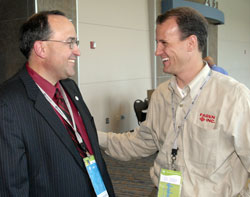 A recent announcement was made by Michigan Governor Jennifer M. Granholm and Michigan Department of Labor & Economic Growth Director Keith W. Cooley that will allow funding for E85 infrastructure at fourteen retail facilities throughout Michigan. This endeavor is part of an initiative that will bring more renewable fuels to the state.
A recent announcement was made by Michigan Governor Jennifer M. Granholm and Michigan Department of Labor & Economic Growth Director Keith W. Cooley that will allow funding for E85 infrastructure at fourteen retail facilities throughout Michigan. This endeavor is part of an initiative that will bring more renewable fuels to the state.
“Investing in alternative energy infrastructure and promoting the use of ethanol is an important element of our effort to diversity Michigan’s economy,” Granholm said. “This program will help deliver the 267 million gallons of ethanol per year Michigan already produces and will deliver advanced cellulosic ethanol as it comes online.”
Stations will receive up to $70,000 to install their E85 infrastrucure. All have agreed to begin selling the alternative fuel by November 15 of this year. The awardees and cities they will be selling the fuel are:
Corrigan Oil Corp., (Brighton)
Coyne Oil Corp., (Mount Pleasant)
Downtown Wixom Development, (Wixom)
Haggerty Joy Mobil, (Canton)
Jawad Marathon, (Southfield)
Ten & Greenfield Sunoco, (Oak Park)
274 Gratiot Corp., (New Haven)
Speedway SuperAmerica LLC, (Cheboygan)
Speedway SuperAmerica LLC, (Davison)
Speedway SuperAmerica LLC, (Jackson)
Speedway SuperAmerica LLC, (Lansing)
Speedway SuperAmerica LLC, (Lansing)
Speedway SuperAmerica LLC, (Livonia)
Speedway SuperAmerica LLC, (Ypsilanti)
Stations can also use the Federal income tax credit that will allow 30 percent of the cost of their project up to $30,000.
There are currently 70 E85 fueling facilties across the state of Michigan.
 An article in the Houston Chronicle this week traces Texas Governor Rick Perry’s request for a waiver of the Renewable Fuels Standard back to a March 25 meeting with Lonnie “Bo” Pilgrim, owner of Pilgrim’s Pride, the country’s largest chicken producer.
An article in the Houston Chronicle this week traces Texas Governor Rick Perry’s request for a waiver of the Renewable Fuels Standard back to a March 25 meeting with Lonnie “Bo” Pilgrim, owner of Pilgrim’s Pride, the country’s largest chicken producer.  According to the article, Pilgrim gave $100,000 to the Republican Governors Association chaired by Perry shortly after that meeting.
According to the article, Pilgrim gave $100,000 to the Republican Governors Association chaired by Perry shortly after that meeting. 

 Researchers at Rice University are finding more uses for the glut of glycerin brought about by the rise in popularity of biodiesel.
Researchers at Rice University are finding more uses for the glut of glycerin brought about by the rise in popularity of biodiesel.  Regulators have given Iowa-based Renewable Energy Group (REG) the green light for finalizing its buy of a U.S. Biodiesel plant in Houston, Texas.
Regulators have given Iowa-based Renewable Energy Group (REG) the green light for finalizing its buy of a U.S. Biodiesel plant in Houston, Texas.
 Greg Anderson, a family farmer who grows soybeans near Newman Grove, Nebraska (and serves as an ex-officio member of the United Soybean Board Executive Committee) makes some pretty strong arguments that there is not a great food shortage brought on by the rise in popularity of biodiesel:
Greg Anderson, a family farmer who grows soybeans near Newman Grove, Nebraska (and serves as an ex-officio member of the United Soybean Board Executive Committee) makes some pretty strong arguments that there is not a great food shortage brought on by the rise in popularity of biodiesel: City vehicles in Jacksonville, Florida’s will be running more and more on biodiesel… and the green fuel will help clean up the city’s waste.
City vehicles in Jacksonville, Florida’s will be running more and more on biodiesel… and the green fuel will help clean up the city’s waste.

 The
The  Putting the acreage report in context with respect to America’s ethanol industry,
Putting the acreage report in context with respect to America’s ethanol industry,  Another representative of Fagen Incorporated has joined the ranks in the
Another representative of Fagen Incorporated has joined the ranks in the